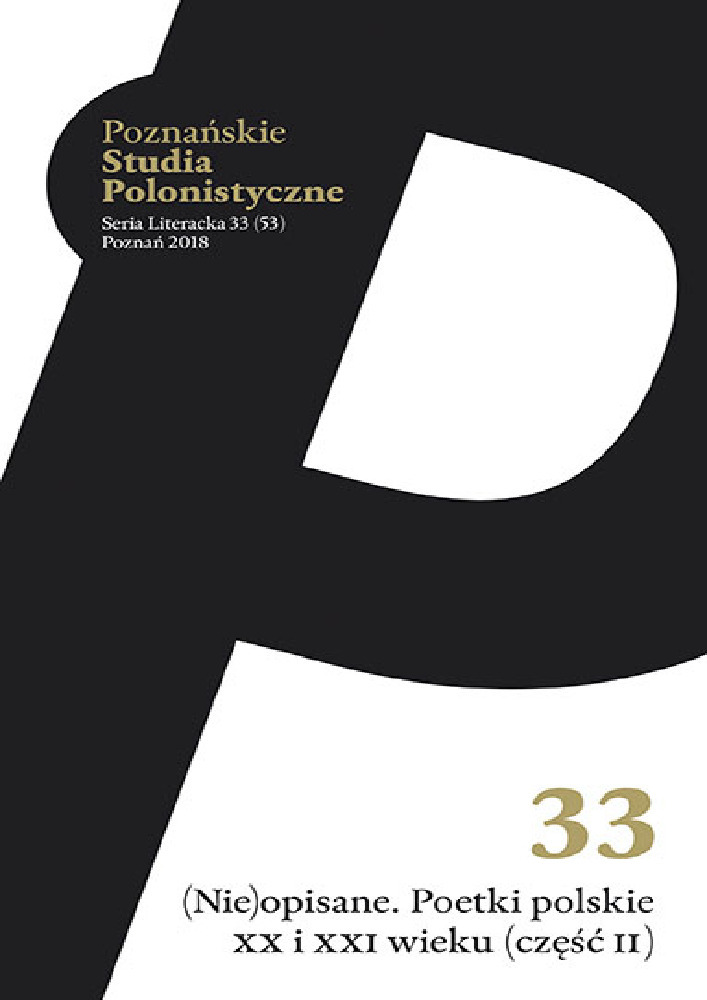Abstract
The essay concerns the work of Joanna Mueller, who is one of the main representatives of polish linguistic poetry. Her project combines the tradition of linguistic poetry and body experience. This strategy requires the development of a new understanding of the language, which will no longer be conceived as a trap references, but rather as one of many elements of reality. The best way to describe the work of the poet’s imagery is stratification, both in terms of the attitudes adopted by Mueller, by the subjects, to the construction of the poem. Equally important it seems to be the prospect of motherhood, both in terms of artistic activity, as well as the practices of life.References
Barańczak Stanisław (1971), Nieufni i zadufani. Romantyzm i klasycyzm w młodej poezji lat sześćdziesiątych, Ossolineum, Wrocław.
Bogalecki Piotr (2015), Od apokryfu do „anarchomistycyzmu”. Postsekularne narracje (liryczne) Joanny Mueller, „Świat i Słowo”, nr 1 (24), s. 131-145.
Cecko Marcin i inni (2003), Manifest neolingwistyczny, „LiteRacje”, nr 1, s. 18.
Chlebnikow Wielimir (2005), O poezji współczesnej, w: Rybak nad morzem śmierci. Wiersze i teksty 1917-1922, przeł. i oprac. Adam Pomorski, „Open” Wydawnictwo Naukowe i Literackie, Warszawa, s. 69-70.
Jakobson Roman (1989), Podświadome modelowanie werbalne w poezji, w: W poszukiwaniu istoty języka, t. 2, przeł. Maria Renata Mayenowa, PIW, Warszawa, s. 142-156.
Komendant Tadeusz (2003), Posłowie, w: J. Mueller, Somnambóle fantomowe, Zielona Sowa, Kraków, s. 9-10.
Kremer Aleksandra (2009), Poza język? Utopie w poezji Joanny Mueller, „Tekstualia. Palimpsesty literackie, artystyczne, naukowe”, nr 2 (17), http://www.tekstualia.pl/images/ArchiwumNumerow/strategie_poetyckie_2_17_2009/Kremer_Aleksandra-Poza_jezyk.pdf [dostęp: 12 lutego 2017].
Kulówna Agata (2003), Nowe słowa, „Ha!art”, nr 3-4, s. 37-38.
Mueller Joanna (2003a), Czy istnieje jeszcze poezja lingwistyczna?, „LiteRacje”, nr 1, s. 3-5.
Mueller Joanna (2003b), Projekt krytyki anamorficznej, czyli o co chcielibyście zapytać podtytuł „LiteRacji”?, „LiteRacje”, nr 2, s. 8-9.
Mueller Joanna (2004), Mapa do Kratylandii, „LiteRacje”, nr 1, s. 29-37.
Mueller Joanna (2005), Neolog [zamiast nekrologu], „Lampa”, nr 2, s. 35-36.
Mueller Joanna (2010a), Stratygrafie, Biuro Literackie, Wrocław.
Mueller Joanna (2010b), Wylinki, Biuro Literackie, Wrocław.
Mueller Joanna (2013), Powlekać rosnące (apokryfy prenatalne), Biuro Literackie, Wrocław.
Nancy Jean-Luc (2002), Corpus, przeł. Małgorzata Kwietniewska, słowo/obraz terytoria, Gdańsk.
Przyboś Julian (1967), Sens poetycki, t. 1, Wydawnictwo Literackie, Kraków.
Roszak Joanna (2007), Liryzm czy lingwizm? Rozmowa z neolingwistką Joanną Mueller, http://www.polityka.pl/tygodnikpolityka/kultura/236519,1,rozmowa-z-neolingwistka-joanna-mueller.read [dostęp: 12 lutego 2017].
Steiner George (2004), Gramatyki tworzenia, przeł. Jerzy Łoziński, Zysk i S-ka, Poznań.
Szopa Katarzyna (2015), Hemopoez(j)a. Wokół biolingwistycznej poezji Joanny Mueller, „Wakat”, http://wakat.sdk.pl/hemopoezja-wokolbiolingwistycznej-poezji-joanny-mueller/ [dostęp: 12 lutego 2017].
License
Authors
Authors of texts accepted for publication in „Poznańskie Studia Polonistyczne. Seria Literacka” are required to complete, sign and return to the editor's office the Agreement for granting a royalty-free license to works with a commitment to grant a CC sub-license.
Under the agreement, the authors of texts published in „Poznańskie Studia Polonistyczne. Seria Literacka” grant the Adam Mickiewicz University in Poznań a non-exclusive, royalty-free license and authorize the use of Attribution-NoDerivatives 4.0 International (CC BY-ND 4.0)Creative Commons sub-license.
The authors retain the right to continue the free disposal of the work.
Users
Interested Internet users are entitled to use works published in „Poznańskie Studia Polonistyczne. Seria Literacka” since 2016, for non-commercial purposes only, under the following conditions:
- attribution - obligation to provide, together with the distributed work, information about the authorship, title, source (link to the original work, DOI) and the license itself.
- no derivatives - the work must be preserved in its original form, without the author's consent it is not possible to distribute the modified work, such as translations, publications, etc.
Copyrights are reserved for all texts published before 2016.
Miscellaneous
Adam Mickiewicz University in Poznań retains the right to magazines as a whole (layout, graphic form, title, cover design, logo etc.).
